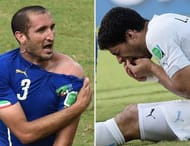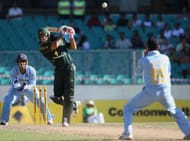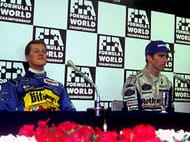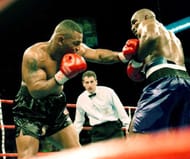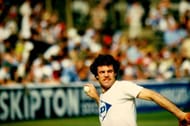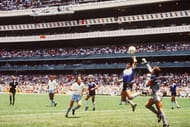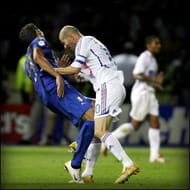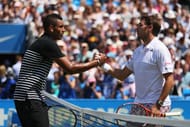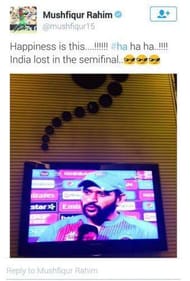Over the years, there have been several displays of unsportsmanlike behaviour by athletes both on and off the field. Many times, players have escaped without punishment with their errors not spotted by match officials or referees.
Here, we look at 10 of the most well-known cases of bad sportsmanship:
Lewis Hamilton, Monaco Grand Prix 2015
Lewis Hamilton, fresh off his third World Championship title, ranks among the best in the sport, and even in 2016, despite not being able to match up to his 2015 performances, showed immense racing skill at the recently-concluded Chinese Grand Prix, with a decent points finish after a back-of-the-grid start.
Unfortunately for the Briton, he has also become known for his reprehensible behaviour off the track. His rivalry and fallout with teammate Nico Rosberg was played out openly in the international media over the 2015 Formula One season.
Although Hamilton ran away with the championship halfway through the season, Rosberg took a late charge to make up for the first half of the year. At that year's Monaco Grand Prix, it was reigning champion Hamilton who started on pole, hoping to widen his championship lead.
Rosberg took an early lead and stuck to it until the end of the race – which incensed Hamilton, who eventually finished in third behind Sebastian Vettel of Ferrari. In his anger, Hamilton drove into the sign marker at the end of the street track, knocking it down.
That was not the end of his behaviour; with Rosberg, Vettel and Hamilton called up onto the podium, Hamilton refused to acknowledge his teammate at all, to widespread criticism from team bosses, Merecdes AMG non-executive chairman Niki Lauda, and F1 icons and former world champions John Surtees and Mika Hakkinen.
Matters have been tense between the teammates and childhood friends, who grew up together on the karting circuit. With Rosberg running away with the championship lead three races into the season, it remains to be seen how matters play out between the pair. For now, Mercedes F1 team boss Toto Wolff has also admitted publicly that all is not well between the pair, but the team are managing for the moment.
Luis Suarez bites Giorgio Chiellini, FIFA World Cup 2014
Uruguayan striker Luis Suarez has become synonymous with biting, after three separate incidents of him chomping down on players have come to light. On this occasion, he was playing in the 2014 FIFA World Cup, with Uruguay fighting Italy in the teams’ Group D qualification match.
Uruguay eventually beat Italy 1-0 to progress to the quarter-finals, but Suarez tarnished proceedings at the Arena das Dunas in Brazil with the third bite of his career.
With 10 minutes of regular time to go and neither team having scored, Suarez chomped on Chiellini’s right shoulder. Amazingly, the move went unnoticed by match referee Marco Antonio Rodriguez – taken note of, it would have invited a certain red card.
Uruguay eventually went on to win after Diego Godin scored, eliminating Italy from the tournament. Chiellini and other Italian players alleged a conspiracy, questioning why Suarez had not been booked on the pitch.
Eventually, Suarez was handed a retroactive four-month ban from any football-related activity; in addition to this, he received a ban of nine international matches, effectively ruling him out of the remainder of the Cup.
Suarez later alleged that he ‘lost his balance and fell’ on the defender’s shoulder, but given his lack of credibility and his history with biting players, his alibi was widely derided. He has since said he is ‘receiving professional help to control (my) biting impulses.‘
Harbhajan Singh and Andrew Symonds, ‘Monkeygate’, Border-Gavaskar Trophy 2008
The incident tarnished the name of Indian cricket, and Harbhajan Singh went down in history for the racial abuse meted out to Australian cricketer Andrew Symonds.
Symonds, who is of indigenous descent, has faced racism before, and unfortunately in India. With Australia touring the country for an ODI series the year before, Symonds was the subject of 'monkey' chants from members of the Indian public.
Matters intensified at the Border-Gavaskar trophy. With Harbhajan and Sachin Tendulkar in a vital partnership for India, attempting to reconsolidate the side after a series of wickets had tumbled in succession.
Harbhajan is said to have tapped bowler Brett Lee with his bat after hitting him to the boundary, with Symonds saying he spoke to Harbhajan in retaliation to his behaviour towards Lee.
Symonds said he then told Harbhajan ‘exactly what I thought of his behaviour,’ which prompted a hot-tempered Harbhajan to react with profanity. Although Symonds and Ricky Ponting both heard the word 'monkey', which given the context it is not unreasonable to see Symonds construe as a racial insult, non-striker Sachin Tendulkar later clarified in his autobiography that Harbhajan had used an extremely derogatory Hindi profanity addressed to the recipient’s mother.
Given the close pronunciation of that profanity with the word ‘monkey’, Harbhajan was reported to match referee Mike Procter, and eventually handed a three-match ban. That ban was later lifted due to insufficient evidence, which meant Harbhajan was not charged with racial abuse, but the lesser misdemeanour of using abusive language on the pitch and fined 50% of his match fee.
The pair have been teammates in the IPL, with both signed to the Mumbai Indians.
Michael Schumacher and Damon Hill, Australian Grand Prix 1994
Michael Schumacher is widely considered one of the greatest Formula One drivers in the sport's long history, and by many the Greatest of All Time. Statistically, he is the greatest, with an unparalleled seven world championship titles to his name.
The German showed a masterful handling of rainy conditions that few drivers before or since have. But he was also iconic for his aggression – an aggression that sometimes saw him use not the most ethical or sporting of tactics to win.
This incident dates back to the Australian Grand Prix of 1994. Unlike the current Formula One calendar, where the Australian GP opens the racing season, it was then the sixteenth and final race.
The two frontrunners for the championship title had been Schumacher, with Benetton-Ford, and British driver Damon Hill of Williams, who was only one point behind the German in the standings. A win for Hill would have meant he won the championship.
Although Nigel Mansell, Hill’s teammate at Williams-Renault, had qualified on pole, it was Schumacher who took an early lead in the race, with Hill right behind him. They remained in formation for a little less than half the race, at which point Hill charged to narrow the then-Benetton driver’s lead.
Hill attempted to take a jump on Schumacher at the fifth turn of the track, when Schumacher turned inwards, effectively ending the race for both himself and Hill.
Michael Schumacher won the 1994 World Championship, the first of his seven, and also the first time a German had won the title. With the crash adjudged a racing incident, no action was ever taken against Schumacher, who maintained his own innocence, while Hill has since gone on record to say he was “100% sure it was intentional.”
It is widely considered one of the most unsporting moments in Formula One history.
Evander Holyfield vs Mike Tyson II, The Sound and the Fury, 1997
This was the pair's second professional bout, and it was referred to as Evander Holyfield vs Mike Tyson II – a rematch of their previous bout in 1996.
Tyson, defending his WBA title at the time, was widely the favourite to win the first match in 1996 despite Holyfield having won a championship title earlier. He would end up surprising Tyson with unprecedented strength and speed, and controlled the fight, which eventually went in his favour.
The pair had a widely-touted rematch the following year, and one that would eventually go down in history for all the wrong reasons.
At the 1997 match, called The Sound and the Fury, Holyfield dominated Tyson early on, with Tyson receiving a slight cut to the head from a headbutt in the second round. It was in the third round that the infamous ‘biting’ incident occured.
Towards the end of the third round, Tyson lunged at Holyfield, biting off a one-inch piece of cartilage from his rival’s right ear and spitting it onto the ground. Despite this, a doctor determined Holyfield was fit enough for the match to continue. Tyson then bit Holyfield’s left ear, and that ended the match, with Tyson being disqualified. Holyfield went on to win the title and championship.
Greg/Trevor Chappell, Australia-New Zealand ODI series, 1981
Captained by Greg Chappell, Australia were playing New Zealand in a One-day International series at the MCG, a series the two teams were halfway through. Then playing the third match, each team had won one match, with the series tied at 1-1.
Australia had set the visitors a 236-run target, and the Kiwis needed 15 runs from the final over with four wickets in hand. That over was being bowled by right-arm medium pace bowler Trevor Chappell, also the younger brother of Greg.
After a couple of boundaries, New Zealand needed six off the last ball to tie the match. At this point, the older Chappell instructed younger brother Trevor to bowl underarm to striker Brian McKechnie to prevent the maximum.
As the action was not at the time illegal, Australia won the match, but the team were booed by the home crowd and several were extremely critical of the incident. Third Chappell brother Ian, who was commentating on the match, famously called out “No, Greg, you can’t do that” on the microphone during the match.
It was also met with scorn from iconic commentator Richie Benaud and the Prime Ministers of Australia and New Zealand.
Unfortunately for Trevor Chappell, his name has gone down in cricketing history largely solely on the back of that incident.
Diego Maradona, Hand of God, 1986 FIFA World Cup
It has since gone down as one of the most iconic moments in sporting history, but Diego Maradona’s goal off his hand at Argentina’s 1986 World Cup quarter-final match against England was, by all sporting rules, illegal.
With the teams tied in the thensofar non-scoring match, Maradona opened the scoring in the 51st minute with the now-famous ‘Hand of God’ goal, which, as the name suggests, came off his hand.
Argentina would go on to win the match and the final to take the 1986 World Cup, but at that quarter-final against England, the referee had not seen the ball go off Maradona’s hand. He would eventually go on to win the golden ball at the tournament.
After the match, Maradona famously said in Spanish, that the goal was scored "un poco con la cabeza de Maradona y otro poco con la mano de Dios“ – translated, ‘a little off the head of Maradona, a little off the hand of God.”
Zidane headbutts Materazzi, 2006 FIFA World Cup Final
Tempers were high, and understandably so. Italy took on France at the finals of the FIFA World Cup in 2006 in Germany, and to add to the already emotionally charged atmosphere at the stadium, French football legend Zinedine Zidane was playing his last ever match.
Both Zidane and Materazzi had scored for their respective teams, with Zidane’s 9’ goal coming off a penalty conceded by Materazzi, who went on to equalize 8 minutes later.
With the teams tied at 1-1 at the end of 90 minutes, the match was forced into extra time. The two, jogging close to each other on the pitch, were seen to engage in a minor verbal altercation, which saw Zidane initially began to walk away.
Only moments afterward, the Frenchman turned around to fiercely headbutt the Italian striker in the chest and knocked him to the ground. After the referee, who did not see the incident occur, was informed of it, he awarded Zidane a red card – the second time he had been red-carded in a World Cup tournament, with the first during France’s match against Saudi Arabia during the 1998 edition of the tournament.
Italy eventually won in 2006 through a penalty shootout, with most placing the blame of the incident on Zidane. Several avowed that Materazzi had ‘what was coming to him’ after the verbal provocations, although nobody except the two parties involved genuinely knew what had gone on on the pitch.
Materazzi and Zidane later confirmed it had been a crude generic reference to Zidane’s sister, and although Materazzi did admit to verbally provoking the star, most said that given trash talking and minor sledging are routine for most sports, the French player should not have resorted to physical violence in retaliation.
Zidane later repeatedly referred to his regret over the incident.
Nick Kyrgios sledges Stan Wawrinka, Rogers Cup 2015
Young Australian ace Nick Kyrgios is in the news more for his unsportsmanlike behavior than his doubtless strong tennis skills.
At the pair's match at the Rogers Cup in Montreal, Canada in 2015, Kyrgios was playing an injured Wawrinka, who was struggling with an aching back on court. The Swiss would eventually retire trailing 0-4 in the third set, but not before a display of reprehensible behaviour by Kyrgios.
Trash-talking his Swiss opponent, Kyrgios referenced a player who Wawrinka is purported to have been seeing following his divorce – Croatian player Donna Vekic, a former training partner of Kyrgios’ compatriot and fellow young talent Thanasi Kokkinakis, making a crass remark alleging that the Australian had slept with 19-year-old Vekic.
Courtside microphones picked up the remark, although Wawrinka had not heard it at the time. Later, the Swiss confronted Kyrgios in the locker room, with the Australian later issuing an apology via social media and a press representative.
He was fined US$10,000 for the incident, with a further $2,500 fine for insulting a ball person.
Mushfiqur Rahim celebrates India's loss on Twitter, ICC World T20 2016
The recently-concluded ICC World Cup saw India progress to the semi-finals after a 3-run match-winning streak. That streak included an extremely close victory over the Bangladesh side in the quarter-finals, with India winning by a single run.
India would go on to play, and lose to the West Indies in the semi-finals, following which Mushfiqur tweeted to celebrate the loss.
He was met with widespread criticism and derision, and later deleted the tweet, sending out an apology saying he was a “big West Indies fan.”
